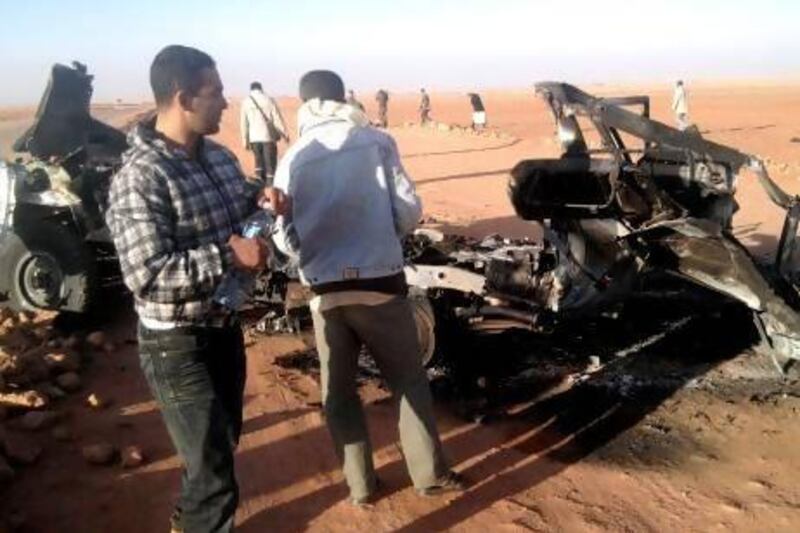ALGIERS // A veteran Islamist fighter claimed responsibility on behalf of Al Qaeda for the Algerian hostage crisis, a regional website reported yesterday, while Algerian bomb squads found more bodies as they searched the gas plant a day after a bloody raid ended the four-day siege of the desert refinery.
"We in Al Qaeda announce this blessed operation," Mokhtar Belmokhtar said in a video, according to the Sahara Media website, which quoted from the recording that tied the siege to France's intervention across the Sahara in Mali.
"We are ready to negotiate with the West and the Algerian government provided they stop their bombing of Mali's Muslims," said Belmokhtar, a one-eyed veteran guerrilla who fought in Afghanistan in 1980s and in Algeria's civil war in the 1990s.
Algerian special forces clearing the In Amenas plant yesterday captured five militants alive in addition to finding "numerous" new bodies, a security official said. He said the bodies were badly disfigured and "could be either Algerian or foreign hostages".
Private Algerian television station Ennahar said that 25 bodies had been discovered at the Tiguentourine plant, adding that the operation to clear the base would last 48 hours. The bodies were believed to belong to hostages executed by the militants, said Ennahar TV.
Algeria said it expected to raise its preliminary death tolls of 23 hostages and 32 militants killed in the siege.
Belmokhtar's fighters launched their attack on the plant before dawn on Wednesday, just five days after French warplanes began strikes to halt advances by Islamists in neighbouring northern Mali.
European and US officials say the raid was almost certainly too elaborate to have been planned in so short a time, although the French campaign could have been one trigger for fighters to launch an assault they had already prepared.
"We had around 40 jihadists, most of them from Muslim countries and some even from the West," Sahara Media quoted Belmokhtar as saying. Algerian officials say Belmokhtar's group was behind the attack but he was not present himself.
Some western governments have expressed frustration at not being informed in advance of the Algerian authorities' plans to storm the complex. However, Britain and France both defended the Algerian action in public.
"It's easy to say that this or that should have been done. The Algerian authorities took a decision and the toll is very high but I am a bit bothered ... when the impression is given that the Algerians are open to question. They had to deal with terrorists," French foreign minister Laurent Fabius said.
British prime minister David Cameron said in a televised statement: "Of course people will ask questions about the Algerian response to these events, but I would just say that the responsibility for these deaths lies squarely with the terrorists who launched this vicious and cowardly attack."
The Islamists' assault has tested Algeria's relations with the outside world, exposed the vulnerability of multinational oil operations in the Sahara and pushed Islamist radicalism in northern Africa to centre stage.
Algeria, scarred by the civil war with Islamist insurgents in the 1990s which claimed 200,000 lives, has insisted there would be no negotiation in the face of terrorism.
France especially needs close cooperation from Algeria to have a chance of crushing Islamist rebels in northern Mali. Algiers has promised to shut its porous 1,000km border with Mali to prevent Al Qaeda-linked insurgents simply melting away into its empty desert expanses and rugged mountains.
Algeria's permission for France to use its airspace, confirmed by Fabius last week, also makes it much easier to establish direct supply lines for its troops which are trying to stop the Islamist rebels from taking the whole of Mali.
Algeria's interior ministry had reported on Saturday that 23 hostages and 32 militants were killed during the assaults launched by Algerian special forces to end the crisis, with 107 foreign hostages and 685 Algerian hostages freed.
With so much still unknown about the fates of foreigners held at the sites, countries that have faced casualties have yet to issue full counts of the dead. The plant was run jointly by Britain's BP and Norway's Statoil with the Algerian state oil company. A Japanese engineering firm and a French catering company also operated there.
* With additional reports from Associated Press and Agence France-Presse





